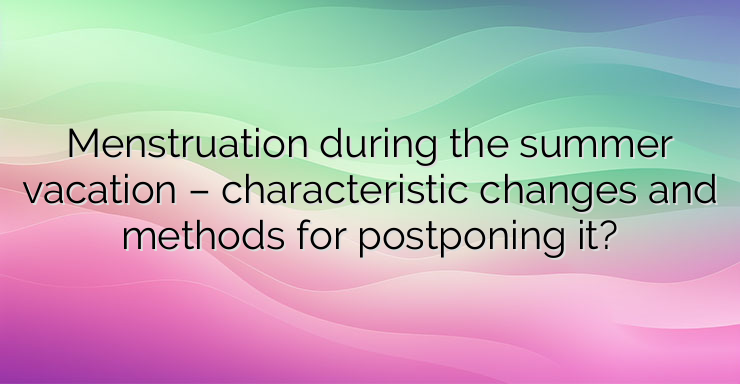Menstruation is a physiological process of periodic shedding of the growing endometrial mucosa in the absence of fertilization. Normally, the first menstruation (menarche) occurs between the ages of 11 and 15, with the average age for Bulgarian girls being 12.7 ± 1.2 years. Menstruation is characterized by a certain frequency, duration and abundance, which, despite physiological norms, can vary within certain limits in individual women. During the summer season, many women experience changes in the cyclicity of the menstrual cycle, in its abundance and duration. In addition, many women, due to a planned vacation coinciding with the onset of menstruation, want to postpone the expected menstruation for a few quiet, relaxing days at the beach. How safe such postponement is and what methods exist for postponing menstruation, we will consider in the following lines. The physiological duration of the menstrual cycle is from 21 to 35 days, with an average of 28 days. During the menstrual cycle, processes of folliculogenesis (formation of mature Graafian follicles), steroidogenesis (production of estrogens and progesterone) and oogenesis (formation of mature eggs) take place. The menstrual cycle is under the control of the hypothalamus-pituitary-ovary axis, and the main place in its regulation is occupied by hormones – gonadotropin-releasing hormone, follicle-stimulating hormone, luteinizing hormone, estrogens and progesterone. In addition, the menstrual cycle consists of two phases – follicular and luteal. During the follicular phase, which lasts on average until the 14th day of the menstrual cycle, the uterine lining grows, the secretion of the glands and the blood supply increase. On average, on the 14th day of the cycle, the peak of the luteinizing hormone occurs, which stimulates the process of ovulation – the release of a mature egg cell. The luteinizing phase always lasts for 14 days, during which, depending on whether fertilization has occurred, the corpus luteum graviditatis or the corpus albicans is formed. Summer is a season during which many women “complain” of a change in the nature of their periods – a change in duration, abundance or frequency. This type of changes are characteristic of women with the so-called cyclolabile type of regulation of the menstrual cycle, i.e. menstrual cycle, which is affected by atmospheric pressure, sudden changes in temperature, humidity, emotional state, stress, etc. In patients with a cyclolabile type of regulation, some of the menstrual cycles may be more often anovulatory (pseudomenstruation), usually menarche occurs later and menopause earlier. The cyclolabile type of regulation of the menstrual cycle is considered a variant of the physiological menstrual cycle, therefore patients should not worry about such temporary climatic changes in menstruation. In case of longer changes in the character of the period, consultation with an obstetrician-gynecologist is necessary. Another very common question,that concerns women at this time of the year is the ways to postpone menstruation and how safe it is to use them. Although there are many methods of postponing menstruation through the use of folk remedies, the only ones that show effectiveness are the applied hormonal preparations. There are two methods of postponing menstruation through the use of hormonal preparations. One of these methods is through the use of combined oral contraceptives (contraceptives), and the more specific in this case is that when taking them for a duration of 21 days, the next pack is started directly without taking a break of 7 days or during this period to take placebo tablets containing no hormone. From the next month, the reception of contraceptives should continue according to the usual scheme. The other method is by taking hormonal preparations containing only progesterone. Their reception should begin 3-4 days before the date of expected menstruation, and the recommended dose is up to 3 tablets per day for a duration of no more than 10-14 days. Up to 2-3 days after stopping the medication, recovery of menstruation is expected. Taking such medications should not happen more than 2 times a year. It is important to emphasize that taking progesterone for a certain period of time does not have a contraceptive effect, the chance of becoming pregnant during this period is not changed, therefore it is recommended to use condoms during sexual intercourse. The use of hormonal medications to postpone menstruation should only occur after consultation with an obstetrician-gynecologist and according to the individual condition and accompanying diseases of the respective patient, in order to avoid adverse reactions and changes in the character of the menstrual cycle.that taking progesterone for a certain period of time has no contraceptive effect, the chance of becoming pregnant during this period has not changed, therefore the use of condoms during sexual intercourse is recommended. The use of hormonal medications to postpone menstruation should only occur after consultation with an obstetrician-gynecologist and according to the individual condition and accompanying diseases of the respective patient, in order to avoid adverse reactions and changes in the character of the menstrual cycle.that taking progesterone for a certain period of time has no contraceptive effect, the chance of becoming pregnant during this period has not changed, therefore the use of condoms during sexual intercourse is recommended. The use of hormonal medications to postpone menstruation should only occur after consultation with an obstetrician-gynecologist and according to the individual condition and accompanying diseases of the respective patient, in order to avoid adverse reactions and changes in the character of the menstrual cycle.


Leave a Reply